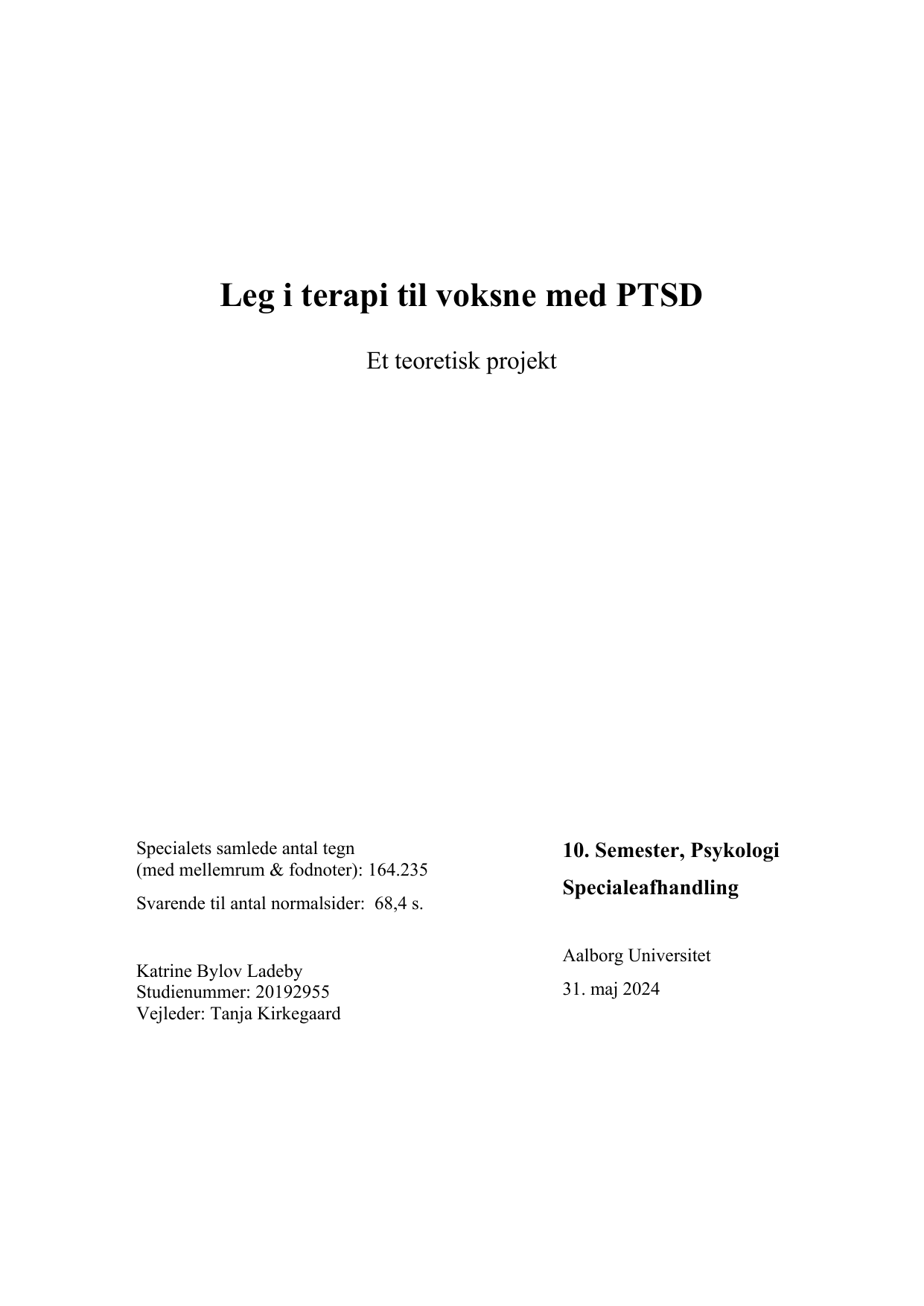
Leg i terapi til voksne med PTSD: Et teoretisk projekt
Oversat titel
Play in therapy for adults with PTSD: A theoretical project
Forfatter
Semester
4. semester
Uddannelse
Udgivelsesår
2024
Afleveret
2024-05-23
Antal sider
68
Abstract
The purpose of this master’s thesis is to theoretically examine the use of play in therapeu- tic practice with adults with posttraumatic stress disorder (PTSD). Thus, the following research question has been formulated: How and to what extent can play be useful in therapeutic work concerning adults with PTSD? In order to investigate the use of play in therapeutic practice, the paper presents a theoret- ical chapter on play as its own, independent phenomena, explaining what play is, why humans play and how it affects us psychologically and physiologically. Extending on this, play therapy is introduced and explained, and drama therapy, Sandplay therapy, and client centered play therapy are introduced. Furthermore, a theoretical chapter on posttraumatic stress disorder (PTSD) is presented, explaining what PTSD is and how it is currently di- agnosed in DSM-5. Here, the psychological and biological effects of PTSD are consid- ered, and the assessment and typical treatment methods of PTSD, Cognitive Behavioural Therapy (CBT) and Eye Movement Desensitization and Reprocessing (EMDR), are pre- sented. Next, a literary review is presented, including two empirical studies of the use of play therapy with adults with childhood trauma. The methodology and results of the two studies are reviewed and critiqued, supporting the relevance of establishing a theoretical basis for further investigation of play therapy for traumatized adults. A theoretical analysis, connecting play, play therapy and PTSD, is presented. Elab- orating sources are used as well as previously presented knowledge from the theoretical chapters of the thesis, to develop a broad and in depth understanding of how play in ther- apeutic practice might help treat specific symptoms or problems in adults with PTSD. From a theoretical standpoint, play in therapeutic practice seems meaningful to incorpo- rate in treating adults with PTSD, in regard to play seemingly being able to counter or alleviate typical PTSD-symptoms such as increased anxiety, psychological and physio- logical stress, relational and social issues, and depressive tendencies. Next, the possible biases of the thesis are discussed. Furthermore, the use of play with adults and specifically adults with PTSD is discussed, contemplating whether adult clients might genuinely acquiesce to participate in therapeutic play at all, and what the possible challenges and limitations to this might be. Extending on this, specific pitfalls of using play in therapy for adults with PTSD is discussed, and the similarities and differ- ences between play and play therapy are considered, with the purpose of investigating whether play therapy can be expected to have the same effects as play outside of therapy. Finally, it is discussed whether it is necessary to investigate alternative therapeutic prac- tices for adults with PTSD, when current treatment methods are deemed effective. Here, a brief synthesis of this paper's findings is presented. In conclusion, this thesis deems play to be a useful tool in multiple aspects of the therapeutic treatment of adults with PTSD. From a psychological point of view, play in therapy might help alleviate depressive symptoms, anxiety, and stress, whilst simultane- ously helping increase the client's confidence, insight in their trauma, and general calm and well-being. Furthermore, therapeutic play might be a useful tool to incorporate when helping PTSD-clients build or regain their social network. From a physiological stand- point, play seems to increase activity in the hippocampus and the prefrontal cortex, which might be helpful for PTSD-clients, who often suffer from decreased activity in these struc- tures, which is leading to decreased stress management. Furthermore, play facilitates the release of dopamine, oxytocin, and serotonin, which increases feelings of well-being, joy and intimacy, whilst simultaneously decreasing the release of stress hormones such as epinephrine and norepinephrine, which are commonly overproduced in clients with PTSD. However, certain PTSD-symptoms, such as dissociation and recurrent flashbacks and nightmares, might be challenging to alleviate using therapeutic play, though it seems that traditional therapeutic approaches such as CBT and EMDR are able to decrease these symptoms. Thus, this thesis concludes, that the use of therapeutic play for treating adult PTSD-clients might be most effective when incorporated with typical PTSD-treatments, that are already deemed effective in helping alleviate PTSD-symptoms. Further investigation on the field of using therapeutic play and play therapy for adults with PTSD is necessary, to determine whether the theoretical implications will be reflected in practice.
Emneord
Leg ; Legeterapi ; Voksne ; PTSD
